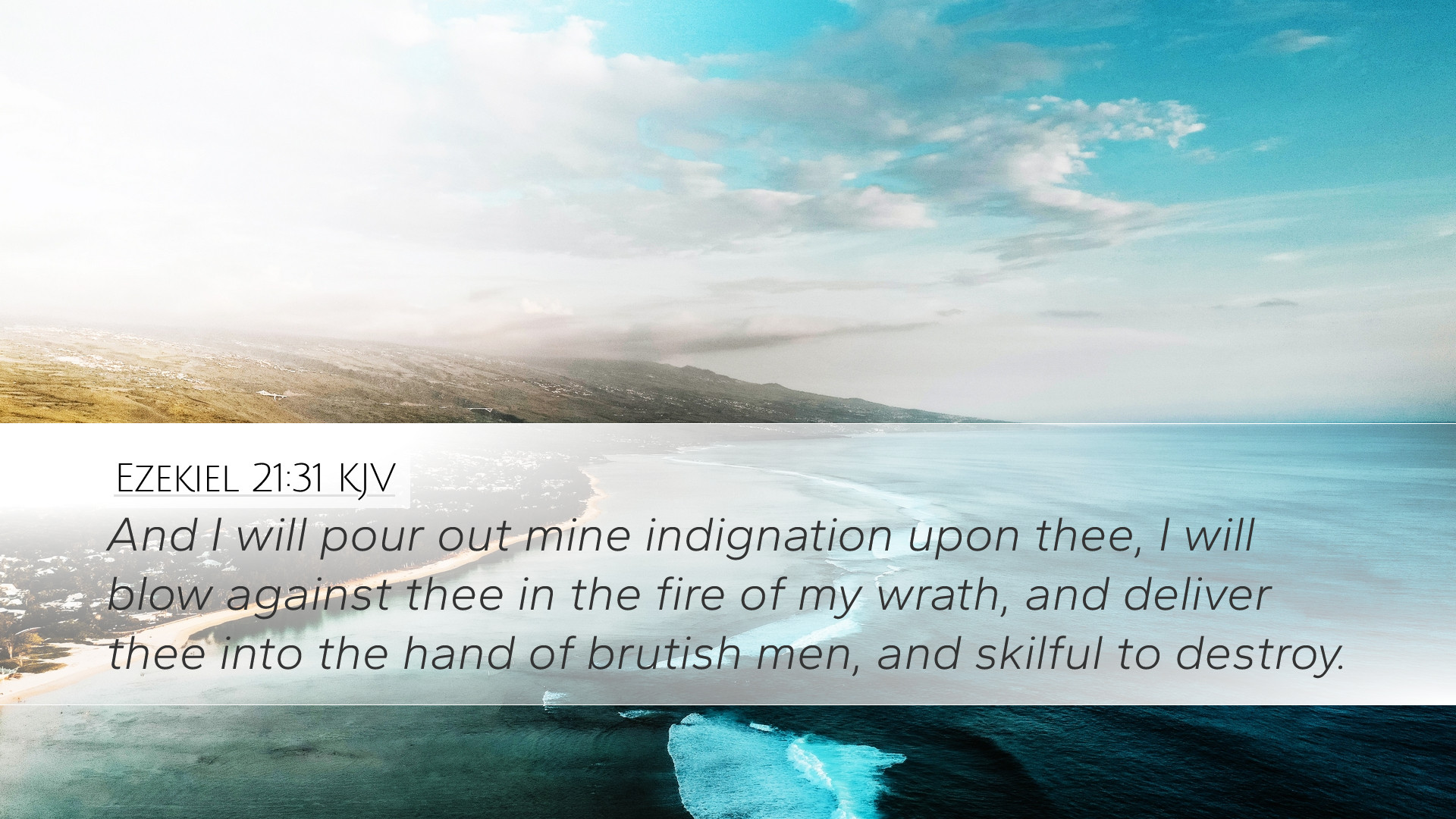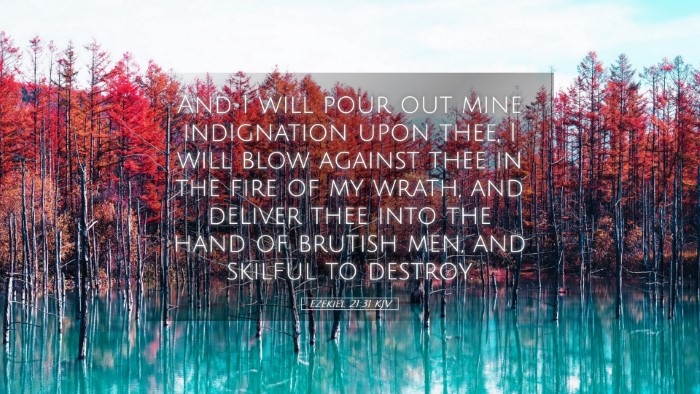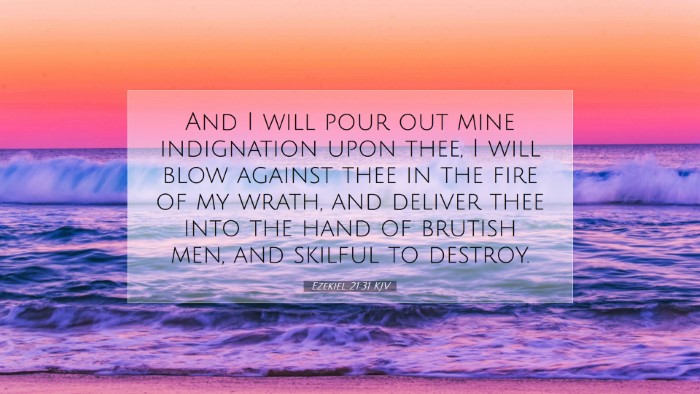Ezekiel 21:31 - Commentary Summary
Ezekiel 21:31 states: "And I will pour out my indignation upon thee, I will blow against thee in the fire of my wrath, and deliver thee into the hand of brutish men, and skillful to destroy." This verse encapsulates God's judgment and the severity of His upcoming actions against the people of Jerusalem and Judah. The following commentary draws insights from several public domain sources, including Matthew Henry, Albert Barnes, and Adam Clarke.
Contextual Overview
This passage is situated within a broader section of prophetic declarations regarding the impending judgment upon Jerusalem. Ezekiel, a prophet during the Babylonian exile, speaks to both the urgency of repentance and the certainty of divine retribution. His messages often serve to warn the Israelites of the consequences of their persistent disobedience.
Matthew Henry's Insights
Matthew Henry emphasizes the attributes of God revealed in this verse—primarily His righteousness and justice. Henry asserts that God's anger is a result of the people's continual rebellion against Him. He indicates that divine wrath is not arbitrary but rooted in the seriousness of Israel's sin.
- Divine Indignation: Henry describes God's indignation as a necessary response to sin. He notes that this indignation is not merely emotional but leads to tangible actions against the unrepentant.
- Fire of Wrath: The imagery of fire signifies purification and destruction. Henry interprets this as indicative of both judgment and the hope for eventual spiritual renewal—reflecting the dual nature of God's dealings with humanity.
- Brutish Men: According to Henry, the reference to "brutish men" points toward the Babylonians, who would carry out God's judgment upon Jerusalem. This highlights the theme that God can use even the most ungodly individuals to accomplish His divine purposes.
Albert Barnes' Commentary
Albert Barnes provides a detailed examination of the prophetic metaphors used in this verse. He notes that each element—the indignation, the fire, and the brutish men—serves a clear purpose in conveying the gravity of the situation.
- Indignation and Accountability: Barnes stresses that God’s indignation comes forth as a direct result of sin, and thus, Israel is fully accountable for the consequences of their actions.
- Destructive Forces: He highlights that the “fire of my wrath” depicts not only destruction but also the consuming nature of divine judgment, ensuring that nothing unholy can stand before God’s holiness.
- Instrumentation of Judgment: Barnes points out that God often raises up agents (in this case, brutish men) to bring forth His judgment, affirming that they act under divine sovereignty, even while operating out of their own sinful natures.
Adam Clarke's Perspectives
Adam Clarke offers thoughts that range from linguistic analysis to theological implications. He provides a thorough examination of the Hebrew terms used in the passage, pointing out that subtle nuances enrich the understanding of God's intentions.
- Linguistic Nuances: Clarke delves into the original text and discusses the implications of the word choices. For instance, the term "indignation" in Hebrew carries a weight of intense emotional response, suggesting a deeply felt passion against injustice.
- The Role of Fire: He argues that fire is a symbol of both judgment and refinement, which can be seen as a form of purifying action. Clarke suggests that while God’s judgment is severe, it also aims at bringing people to genuine repentance.
- Prophetic Warning: Clarke emphasizes the prophetic nature of this passage, urging that the message is not just historical but serves as a continual reminder for all generations of the consequences of forsaking God.
Theological Implications
The severe imagery in Ezekiel 21:31 communicates profound theological truths relevant to various audiences, including pastors, theologians, and scholars. The verse powerfully illustrates the character of God in judgment, alongside the need for repentance.
- God's Holiness: The wrath of God is a reflection of His holiness. In a world increasingly indifferent to moral absolutes, this passage serves as a reminder that God’s standards do not waver.
- Human Responsibility: Each individual bears the responsibility for their response to God's revelation. As illustrated in this verse, ignoring or rebelling against divine warnings leads to devastating consequences.
- Judgment and Grace: While the text focuses on judgment, it also implies that the outcomes of divine wrath can lead to restoration if individuals respond in repentance. The duality of judgment and grace is a recurring theme throughout Scripture.
Applications for Contemporary Believers
As pastors and teachers reflect on Ezekiel 21:31, there are several applications that can be drawn for contemporary believers.
- Embrace Repentance: Congregations are encouraged to genuinely repent of their sins and pursue holiness, recognizing the gravity of living in opposition to God's will.
- Understanding Divine Wrath: Modern believers often shy away from discussions of God's wrath. This passage serves as an important reminder that God’s judgment is a fundamental aspect of His being and should be preached faithfully.
- Hope Amidst Judgment: While judgment is serious, believers can find hope in the promise of restoration that follows discipline. This theme can be used to foster resilience in faith during challenging times.
Conclusion
Ezekiel 21:31 serves as a stark reminder of the seriousness of sin and the reality of God's judgment. The combination of insights from Matthew Henry, Albert Barnes, and Adam Clarke provides a rich texture of understanding that aids pastors, students, and scholars in grasping the depth of divine communication. Ultimately, this passage challenges believers to reflect on their lives, embrace repentance, and live in light of God’s holy standards.


